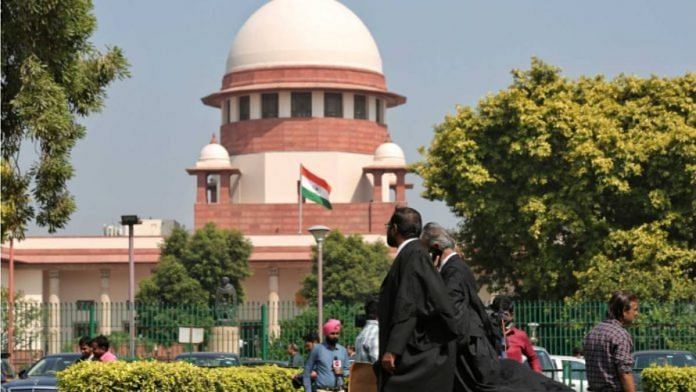New Delhi: More than a decade after the Supreme Court held that auction was a “fair” and “impartial” process to assign spectrum for its usage, the Centre has approached it with a request to clarify its 2012 verdict to allow the government to allocate the natural resource through other legally-valid administrative procedures.
The government’s application said that spectrum was not only required for commercial telecommunication services, but also for non-commercial use for the discharge of sovereign and public-interest functions such as security, safety, disaster preparedness etc. ThePrint has a copy of the application.
If assignment of spectrum was in pursuit of governmental functions or in public interest or if its auction may not be preferred due to technical or economic reasons, then the government may consider allocating the same through processes that are in accordance with law, the application has submitted.
The Centre wanted the court to clarify the 2012 verdict as it was delivered without considering the instances mentioned in the application. A clarification would help the government to firm up its spectrum-assignment framework, including methods other than auction, in suitable cases, to “best subserve the common good”, the application further stated.
In a verdict in February 2012, the apex court had canceled the 2G spectrum allocation, which was then followed up with a directive to the Central Bureau of Investigation to probe what it dubbed as the “2G scam”.
In doing so, the top court set aside the first-come-first serve (FCFS) basis for the assignment of spectrum. The SC had then said: “In our view, a duly publicised auction conducted fairly and impartially is perhaps the best method for discharging this burden and the methods like first-come-first served when used for alienation of natural resources or public property are likely to be misused by unscrupulous people who are only interested in garnering maximum financial benefit and have no respect for the constitutional ethos and values.”
The judgment also observed that the state was duty bound to allot natural resources by giving wide publicity so that all eligible persons can participate in the process. This judgment was delivered on a challenge to the allocation of 2G spectrum in 2008, which was done on FCFS basis.
The challenge was mounted to the process involved in the allocation, including allegations of arbitrary actions in determining the cut-off dates and procedures.
However, in another judgment in September 2012 – on a Presidential reference made to it by the central government – the SC had clarified that the 2G verdict was meant only for 2G spectrum allocation and “never intended to be taken as an absolute or blanket statement applicable across all natural resources”.
Delivered by a constitution bench, this judgment answered two questions posed to it in the Presidential reference – whether auction was the only permissible method for disposal of all natural resources across all sectors and in all circumstances and what was the permissible scope for the court’s interference in policy-making, including in methods for disposal of natural resources.
The September 2012 decision clarified that the 2G judgment “specifically evaluated the validity of methods adopted in the distribution of spectrum from September 2007 to March 2008”.
The bench went ahead to say that the court could not conduct a comparative study of the various methods of distribution of natural resources to suggest the most efficacious mode and that it “respects the mandate and wisdom of the executive for such matters”.
According to it, the methodology pertaining to disposal of natural resources was clearly an economic policy, as it entailed intricate economic choices. It further declared that auction, as an economic choice for the disposal of natural resources, was not a constitutional mandate.
Though it held the court was not competent to compare which policy was fairer, it could test the legality and constitutionality of the methods that were followed to allot natural resources when questioned. And if during the determination process, it was found that the policy was patently foul of Article 14 of the Constitution, the court would not hesitate in striking it down, the bench had ruled in September 2012.
In its application, the Centre has referred to this constitution bench judgment to press for its demand for a clarification of the 2G verdict. It said with regard to telecommunication use, the government has auctioned spectrum in accordance with the top court’s decision.
But with respect to distinct usage such as non-commercial and those areas where auction was not a feasible approach, the government has been assigning spectrum at administratively determined prices.
Due to the 2G judgment, such assignments were not treated final but purely interim and provisional, subject to the government’s final decision on pricing and policy in the matter, it told the court.
Asking the SC to issue appropriate clarifications, the Centre said spectrum allocation was not limited to commercial assignments, but even for non-commercial use for discharge of sovereign and public interest functions such as safety disaster preparedness that would “squarely fall within the scope of subserving common good”.
There could also be situations where spectrum was needed for commercial space, but auction would not be feasible due to technical and economic conditions.
“Such assignments may require to be undertaken administratively due to economic conditions such as demand being lower than supply or due to technical conditions such as spectrum for space communication,” the application contended. In such a scenario, it would be more “optimal” and “efficient” for spectrum to be shared by multiple players rather than being broken into smaller blocks for the sole purpose of exclusive assignment by auction.
(Edited by Tikli Basu)
Also read: CJI Chandrachud praises new criminal laws for ‘holistic approach to deal with crimes in digital age’



